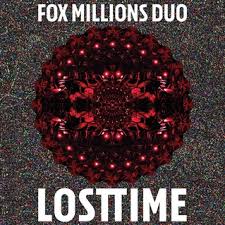It’s no surprise that "time" would figure as a prominent theme on an album by two drummers known for their manic tempos and rhythms. But on Lost Time, busy New York-based percussionists Greg Fox (Liturgy, Guardian Alien) and Kid Millions (Oneida, Man Forever) don’t just play with traditional conceptions of musical time using their instrument of choice. Instead, through a variety of sonic textures and compositional approaches, they investigate the criss-crossing relationships between time, music, and the human body. They’re less concerned with keeping or manipulating time as it happens than with considering what happens after, with what time does to us. Look to the album and track titles: lost time; time lapse; telegy, evoking death (elegy) at a distance (tele-); post encounter effect. And it makes sense—everyone’s always running out of time, right? Can we ever catch up?
Maybe, not. The first of two twenty-minute tracks, ‘Telegy/Time Lapse’ tries its best to keep time with, well, time. After a rolling electronic tone introduces the piece, Fox and Millions dive in with characteristic energy—the kind to which fans of Liturgy or Millions’s People of the North should be accustomed. Tom-tom bursts and clattering cymbals fill both sides of the mix, as that initial synthetic hum continues to move back and forth. Three minutes in, the drummers pause, as though their attempts to keep up with whatever "time lapse" are finished. Seconds later, however, they’re back at it, maintaining the frenetic pace for another four minutes or so—until their drumming gives way to a more subdued, echo-y rhythm. It’s a heartbeat, the pulse of which Fox has explored previously through his studies with jazz drummer Milford Graves, and on his solo album Mitral Transmission.
The heartbeat brings what was an external wrestle with time — the drummers’ physical, limbic maneuvering — inside, as if to locate the source propelling everything forward. Within moments, though, the heartbeat fades and drumless electronic noise enters the fray. Fox and Millions’s appeal to the organic, so to speak, to grapple with the ever-quickening pace of the outside world: did it fail, overburdened by omnipresent noise? What follows are hyper-speed pitter-patter thuds for which Millions and (especially) Fox are revered: an attempt to match time’s pace. The thuds come accompanied by a stream of beleaguered howls that cut, distorted and sorrowful, like a more extreme version of the moans great instrumentalists from Glenn Gould to Bill Orcutt emit. The heartbeats return at one point, and the drumming shifts from Fox’s steady mini-rhythms to a looser, free jazz-style smattering you might hear from Graves or Sonny Murray. In other words, throughout the duration of the piece, Fox and Millions appear to be searching — in and out, through their arsenal of inspired drum techniques — for a means of catching time. And, by their own admittance, they can’t.
As such, they have to go back to the drawing board. It’s not about catching time, they realise; worrying about "lost time" or "time lapses" is exactly what time wants you to do. So on track two, "Post Encounter Effect," Fox and Millions take what they learned on the A-side and set out to define time on their own terms. Slow, thumping drums drive the piece. Fox and Millions’s rhythms coincide at times and are offset at others, sliding in and out of phase—simultaneously steady and irregular, like a heartbeat. Where ‘Telegy/Time Lapse’ takes its energy and inspiration from free jazz and noise, ‘Post Encounter Effect’ more closely resembles subdued statements from Faust or, with its persistent guitar strumming, Popol Vuh at their most percussive. Those strums—curt and consistent—contrast with long-duration electronic tones, supplying the piece with more distinct layers of timed musical noises, suggesting further that Fox and Millions are in effect learning how not to "keep" time but to "make" it.
Indeed, on both of Lost Time‘s pieces, Fox and Millions make good use of non-drum instruments to further their percussive investigations. And although the steadiness of ‘Post Encounter Effect’ threatens to make it a little tougher to sit through than the more immediate, thrilling ‘Telegy/Time Lapse’, its implication—a renewal of our relationship with time, wherein we find agency—arguably renders it more satisfying.
<div class="fb-comments" data-href="http://thequietus.com/articles/18443-fox-millions-duo-kid-millions-greg-fox-lost-time-review” data-width="550">


